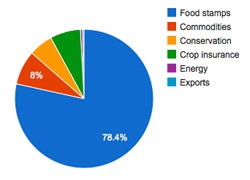Cronkite News has moved to a new home at cronkitenews.azpbs.org. Use this site to search archives from 2011 to May 2015. You can search the new site for current stories.
Farmers frustrated by congressional inaction with farm bill set to expire
WASHINGTON – When the current farm bill expires at 12:01 a.m. Monday, it should have no immediate impact on the farmers and food-stamp recipients who are the beneficiaries of the massive measure.
But that doesn’t mean they have to be happy about it.
“Farmers are trying to plan for next year and after,” said Philip Bashaw, the Arizona Farm Bureau‘s government relations manager. Without a farm bill in place, “there is no real way to do long-term planning and that includes financing. The people that finance these farmers want to know how loans will be paid back.”
The multiyear House version of the farm bill, estimated to cost $957.7 billion over 10 years, stalled this month in wrangling between the Republicans and Democrats in the House, who left Washington last week for a recess that will continue until after the November election. Even though the current farm bill expires Sept. 30, House Speaker John Boehner refused to bring the new bill up for a vote until lawmakers return from recess.
While the bill funds support programs for farmers across the nation, the vast majority of the bill goes to fund food stamps, which went to 45 million Americans last year, according to the U.S. Department of Agriculture.
In Arizona, 1.1 million people received food stamps last month, according to the Arizona Department of Economic Security. USDA said there were 15,500 farms and ranches in the state in 2010, but officials could not say how many of those operations benefit directly from the farm bill.
Even though the current measure will expire, bills will still be paid. Funding for food stamps was extended until at least March 27, 2013, when Congress – which has also failed to pass a new budget for fiscal 2013 – voted to extend the current budget for six months.
And Bashaw said farmers with crops in the ground will continue to be covered under the 2008 farm bill, which expires this weekend. The stalled new farm bill would not impact crops until next year.
Despite that, farmers are frustrated by Congress’ failure to act.
“If we don’t go to work we suffer,” said Eric Rovey, a Glendale dairy farmer who came to Washington this month to urge action on the farm bill. “If those guys (in Congress) don’t go to work, they don’t suffer.”
National Farmers Union President Roger Johnson called the decision to recess disappointing and politically motivated.
“They canceled days they were supposed to be in session,” Johnson said. “It was the earliest they have left since 1960.”
The Senate this summer passed a farm bill – estimated to cost $969 billion over 10 years – and the House Agriculture Committee had approved its own version of the bill. But it stalled when some House members insisted on stripping out food stamps and voting on farm aid and food assistance as two separate bills.
Johnson said House leaders made a political decision not to bring the bill up for a vote because “there would be less damage by ignoring the debate than having the debate” and showing a divided Republican caucus.
“We knew it was an uphill battle to get this done before the election,” Bashaw said. “But the House is making a mistake.”
When Congress comes back after the elections, advocates worry about whether it will be able to pass a new farm bill in a lame-duck session and, if so, what form that bill might take.
“The problem is a logistical one,” Johnson said. “They will have to take it up early and then send it to the Senate for conferencing. Then they will have to settle the differences and vote up or down in both the House and Senate.”
Concern about the future of the bill is not limited to farmers. Ginny Hildebrand, president of the Association of Arizona Food Banks, said the economy is still struggling and now is not the time to make cuts to food stamps.
“The program was built by Congress with the support from the American public to be there when the economy isn’t functioning well,” Hildebrand said. “Enrollment is going to be high because unemployment is high.
“We have a county in Arizona where unemployment is 30 percent. Are we supposed to tell Yuma County, ‘You’re putting too many people on food stamps’?” she asked.
Rovey said he has no issue with the food-stamp portion of the bill, but having it included in the farm bill has caused some frustration for him and other farmers.
“The shame is that 80 percent of the farm bill goes to the SNAP (Supplemental Nutrition Assistance) program,” Rovey said. “Only 20 percent goes to us, yet we hang in the balance. It’s not the farm part that is holding it up. We have made compromises.”
Johnson said the National Farmers Union will advocate for a full five-year bill, not simply an extension to the current one, when Congress comes back in November.
The Arizona Farm Bureau agrees with that strategy.
“A one-year extension, while helpful, doesn’t give certainty for long-term planning,” Bashaw said. “It would take the same amount of time to debate an extension as taking up a new five-year bill.”
If the votes are not there for a new bill, as Boehner has claimed, Hildebrand said she would expect to see approval of a one-year extension of the 2008 bill.
“When Congress finally comes to see there is no way we can get this through, they do a continuing resolution,” said Hildebrand, who said she has watched food-stamp funding for almost 30 years.
“They kick the ball down the road a little further, without defunding anyone, but without making any changes,” she said.










